Fast Fashion Brand Shein Is A Scam With Sweatshops
If you’re on TikTok or Instagram, or if you’re a fan of online shopping in general (as most of us have been for the past two years), you’re more than likely familiar with the Chinese online retail site Shein.
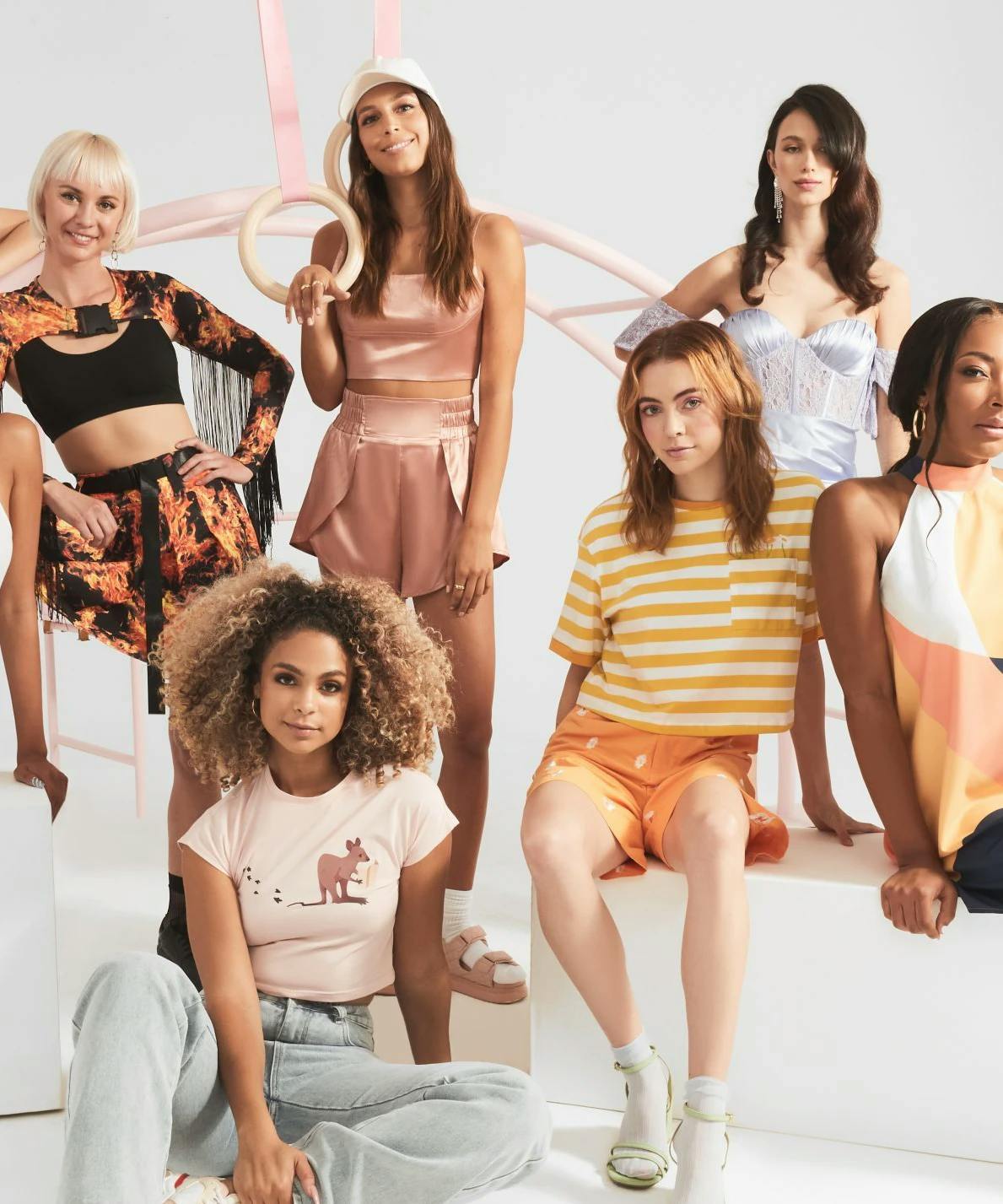
Shein has exploded in popularity in recent years and is a veritable giant when it comes to fast fashion retailers. Fast fashion sites pride themselves on keeping up with the hottest trends and sell their products at cheaper prices, but the products themselves are usually shoddily made by disenfranchised workers in less-than-reputable conditions. Not to mention, fast fashion sites are really, really bad for the environment. But that’s not the only reason conscious consumers are taking notice and speaking up about the retailer’s questionable practices and standards.
How “The Worst of the Worst” Got Its Start
Fast fashion brands are now ubiquitous in our culture, and oftentimes they’re names we know and love. Brands like H&M, Zara, Primark, Fashion Nova, and many more all technically fit into the category of fast fashion retailers, and many of these brands make a name for themselves by exclusively catering to Gen Z and their trends – like activewear or athleisure, crop tops, bike shorts, chunky or abnormally shaped sunglasses…the list goes on and on. However, many argue that when it comes to fast fashion, Shein constitutes “the worst of the worst.” It wasn’t always that way, though.
Founded in China in 2008, Shein first operated as a drop-shipping site, which by definition plays no part in designing or producing products, but sells them to customers through a third party. In 2014, Shein acquired another fast fashion site, Romwe, and by 2016, they had transitioned from a drop-shipping approach to that of an integrated retailer. That same year, the company began developing, designing, and marketing its own Shein-branded products. It’s estimated that, in 2020 alone, the site raked in $10 billion in revenue, making it one of, if not the, most successful fast fashion retailer in the world.
The Shein app has been downloaded more times than the Amazon app.
Much of that success has been attributed to Shein’s marketing. Not only does the retailer have an app that customers can use (which has now been downloaded more times than the Amazon app), but it also has a rewards points system famous among its customers. In exchange for reviews on products (which are usually positive, regardless of whether or not it’s a quality product), customers receive points which they can accrue towards future purchases. It’s brilliant, really – as is the tag “Shein haul,” which now runs rampant amongst YouTubers, influencers, and TikTokers.
The retailer, believe it or not, also has its own reality show which you can stream on YouTube or on the app. Shein X 100K Challenge brings together 30 designers, who compete against one another by showing their own designs and collections at a Los Angeles fashion week for a chance to win $100,000. Amidst valid criticisms of the environmental and ethical harm the online retailer is responsible for, they’ve also distanced themselves from the fast fashion name by opening physical pop-up shops in big cities throughout the country.
Exploitative Factory Conditions
For some, though, the cheap cost of a purse or a bikini isn’t enough to justify getting scammed, which many consumer rights groups have accused the brand of. Shein’s method of sizing and measurement is notoriously random, as is the quality of their products. No matter how glossy or professional the photo may look, you’re more likely than not to get what you pay for when it comes to that $5 pair of leggings, as many forums and reviews will point out. There are also reported issues of terrible customer service, refunding troubles, return issues, and downright crazy delays on shipping or delivery, which have led some to conclude that however popular it may be, Shein is nothing more than a well-advertised scam.
Workers revealed they only got one day off per month, and they worked three shifts per day.
Getting scammed is one thing – then there are the actual human rights abuses Shein employs alongside its workers. A Swiss investigative group, Public Eye, visited 17 Chinese factories which supply Shein’s parent company and its subsidiaries. What they found was truly disturbing.
Interviews with factory workers resulted in Public Eye getting their hands on the truth of what was really going down at these factories. Workers revealed they only got one day off per month, and they worked three shifts per day totaling 75 hours a week. Some workers are salaried “per item,” meaning they have to produce as many items as possible to be paid anything close to a decent wage. Naturally, with this kind of system, quality inevitably falls, resulting in oddly sized, damaged, or subpar products. But new trends and styles arrive daily on the site, which Public Eye estimates to be around 6,000 items per day supplying four continents – meaning the brand has to keep up its bottom line above all else.
Fashion Is One Of the Most Environmentally Damaging Industries - And Shein Makes it Worse
We know by now the sheer amount of damage just one fast fashion brand can have on the environment, namely, because trends are meant to come and go. Fast fashion dictates that we’re not meant to wear the same coat or use the same purse year after year, even though it’s better for our waste production (and our wallets) to do so. Fast fashion retailers also have no problem using cheap, synthetic materials that are terrible for us and the planet. The majority of Shein customers know they’re likely not going to get a dress made from cotton or wool, but when the dress is $8, what does it matter?
But it should matter. Fast fashion pumps microplastics and chemicals into our water supply; in fact, it's responsible for an estimated 20% of global water waste. And the buy-and-throw-away game of brands like Shein has a real impact: 85% of textiles wind up in landfills each year.
Fast fashion brands are notorious for using cheap materials to save costs, and the most notorious of these is polyester. About 55 million metric tons of it are produced annually to keep up with the demand for new fabric. But what most people probably don't know when they check a product's tag is that polyester is actually made from petroleum. Yes, it's basically just plastic in fabric form.
So not only does polyester fabric rely on the oil industry, it does not biodegrade, sometimes taking hundreds of years to break down. This slow process ends up introducing microplastics to our soil and water, which cause their own slew of health issues.
Intellectual Property Theft Runs Rampant
In order to pump out trendy clothes at the drop of a hat, Shein doesn't have time to come up with their own clever designs. Rather, they rely on everyone from big-name brands to small creators and then shamelessly knock off the designs. Name brands like Dr Martens and Ralph Lauren have sued the company for copyright infringement, and more suits are likely to come.
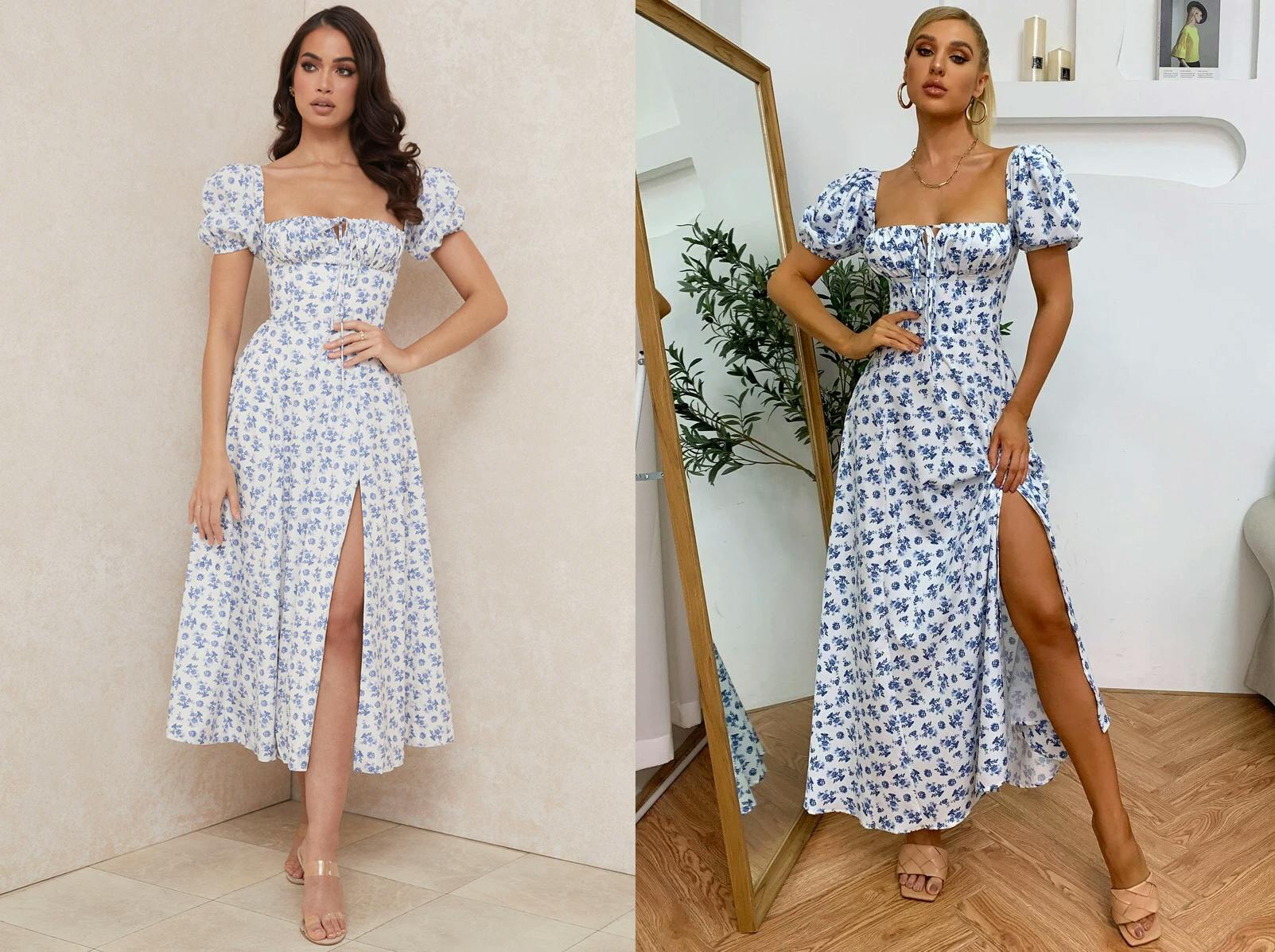
House of CB dress, left, and the Shein knockoff, right.

Cult Gaia dress, left, and the Shein knockoff, right.
Unfortunately, it's not just name brands that are being ripped off. Small creators too have found their work blatantly copied and sold without any commission or credit to the original artist. But unlike massive fashion companies like Ralph Lauren, small businesses and artists lack the financial backing to pursue these intellectual property thefts.
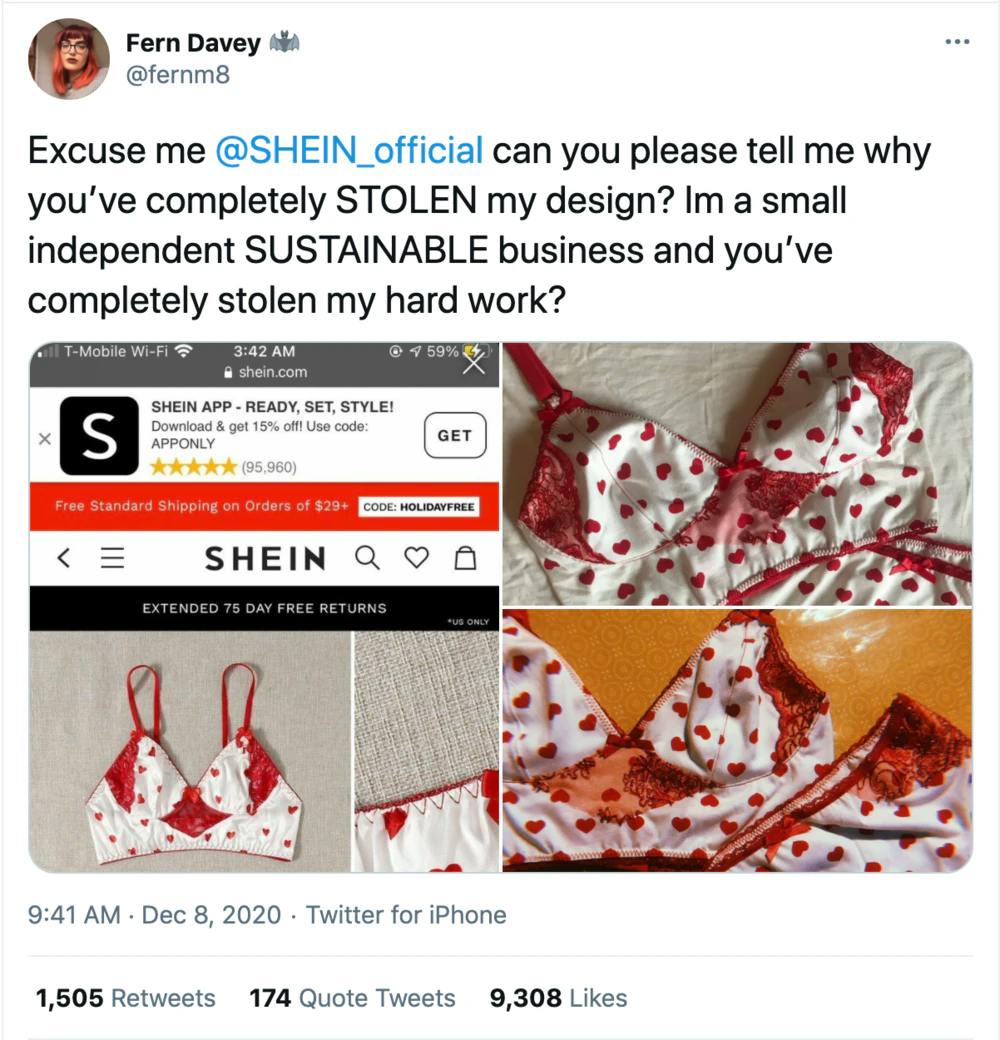
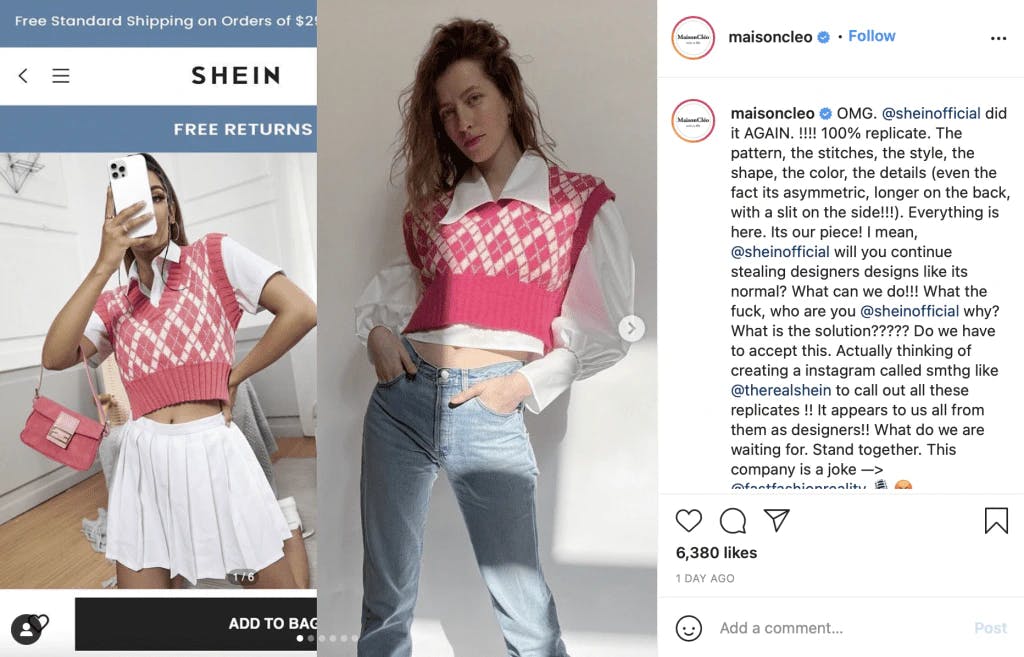
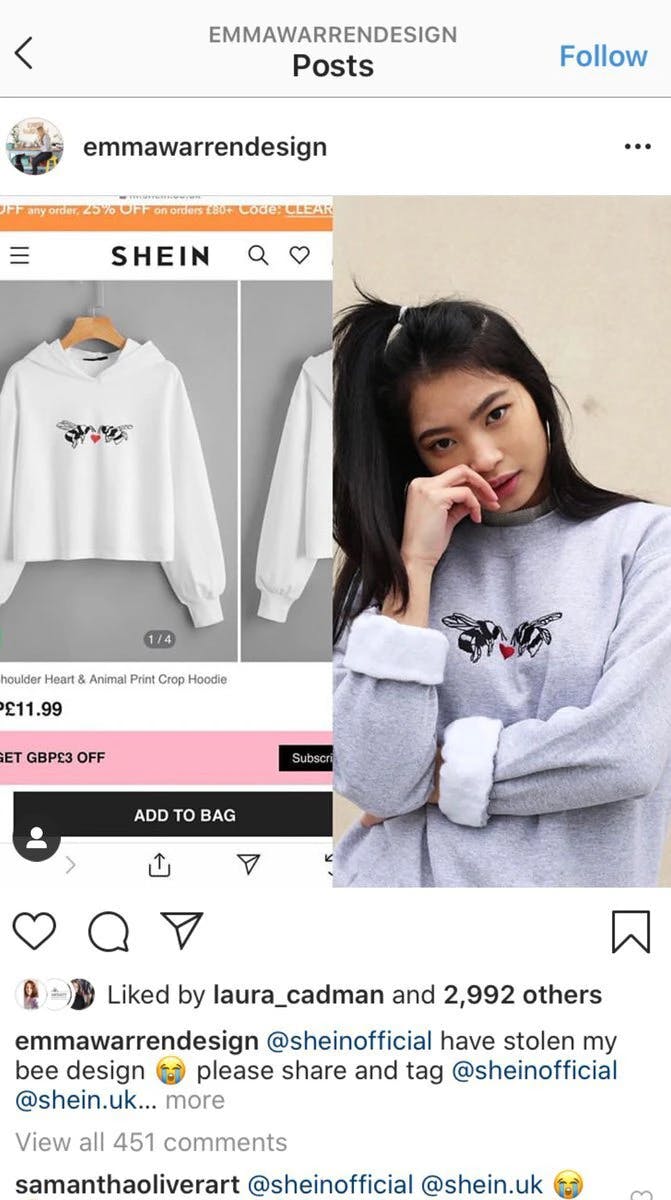
Take Your Money Elsewhere
If you haven’t figured out by now that you should be deleting the app from your phone as fast as possible and taking your money elsewhere, here it is: stop buying from Shein. They don’t respect our planet, their employees, and they don’t even respect you if they’re willing to take you for $7 and a measly blouse (which will be ugly and out-of-style in a year anyway).
Fast fashion has no problem using cheap, synthetic materials that are terrible for us and the planet.
This isn’t really about a pair of bell-bottoms or a baguette purse. It’s about the choices we make as consumers and how they impact the world around us. We’re fortunate in that we get to live in an open economy and a free market. But that also means that we literally have our pick of brands that we patronize – and sometimes, we might make the wrong decision.
We don’t have to, though. Sure, the cost of Shein and similar brands is probably the number one factor in appealing to customers (because it sure as heck isn’t convenience). But there are brands out there that are all about looking cute and dressing stylishly, and their products won’t wind up in a landfill or a trash heap in the near future. Sustainable fashion is the answer to fast fashion. And though we might squirm at the price or the thought of giving up Shein hauls, clothing, as we age, is really about maturity and making an investment in ourselves. When it comes to what we put on our bodies, why wouldn’t we want the best?
Closing Thoughts
Shein is the number one fast fashion retailer in the world right now. But that doesn’t mean it hasn’t engaged in shadiness and downright criminal acts to get there.
Your sunglasses and bucket hat combo won’t be the statement you think it is in a few years, or even a couple of months. But dressing well, including investing in your clothing and the businesses you choose to support, is a trend that never goes out of style.
Love Evie? Let us know what you love and what else you want to see from us in the official Evie reader survey.